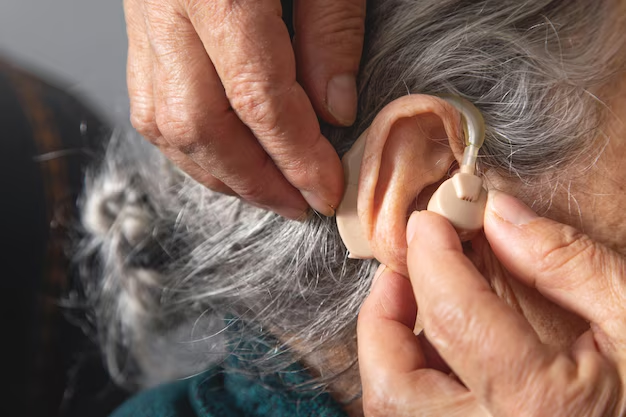Your Guide to Does Medicare Cover Audiology
What You Get:
Free Guide
Free, helpful information about Medicare Insurance and related Does Medicare Cover Audiology topics.
Helpful Information
Get clear and easy-to-understand details about Does Medicare Cover Audiology topics and resources.
Personalized Offers
Answer a few optional questions to receive offers or information related to Medicare Insurance. The survey is optional and not required to access your free guide.
Understanding Medicare's Coverage for Audiology Services
When it comes to understanding Medicare and audiology services, many Americans are searching for clarity. Hearing health is an essential part of our well-being, yet it's often a complicated topic, especially for seniors who are likely to be affected by hearing issues. The big question many have is: what does Medicare cover in terms of hearing and audiology services?
What Medicare Covers
Medicare is a critical program for many older Americans, but it's important to know its limitations. Traditional Medicare (Part A and Part B) generally does not cover regular hearing exams, hearing aids, or exams for fitting hearing aids. This can be a surprise for those newly enrolled in Medicare or those beginning to face hearing challenges in their senior years.
However, there are exceptions. Medicare Part B does cover diagnostic hearing and balance exams, but only if they're deemed medically necessary by a healthcare provider. These exams could include consultations and tests conducted by an audiologist or physician when assessing whether other underlying medical conditions are related to hearing loss.
Medicare Advantage Plans
If you're looking for broader coverage, Medicare Advantage Plans (Part C) might be the answer. These plans, offered by private insurance companies, often include additional benefits such as routine hearing exams and hearing aid coverage. It's vital, however, to examine each plan closely, as benefits can vary widely between providers. Many people find that enrolling in a Medicare Advantage Plan provides the flexibility and coverage they need for hearing-related healthcare.
Exploring Additional Financial Assistance
Given Medicare's limited coverage, many turn to other forms of financial aid to help with hearing-related expenses. Hearing aids, for example, can be costly, and the lack of Medicare coverage means people often need to seek alternative funding. Here are a few options:
- Medicaid: In certain states, Medicaid provides coverage for hearing aids for adults. Eligibility varies by state and is typically income-dependent.
- Veterans Benefits: If you're a veteran, you may be eligible for hearing exams and hearing aids through the Department of Veterans Affairs (VA) hospitals.
- Hearing Aid Manufacturers: Some hearing aid manufacturers offer financial assistance programs or payment plans to make hearing aids more affordable.
The Bigger Picture: Navigating Financial Health
While accessing audiological services is vital, maintaining overall financial health and stability is equally crucial. It's worth exploring various programs and resources that can support seniors in managing their broader financial needs:
- Government Aid Programs: These can assist with healthcare, housing, and nutrition, providing a more comprehensive safety net for seniors.
- Credit Solutions: Managing credit card debt through counseling services or consolidation may offer relief.
- Educational Grants: For those seeking to learn more about personal finance, educational grants or free courses can empower seniors to make informed financial decisions.
In today's interconnected world, it's apt to feel overwhelmed by navigating healthcare and financial planning. However, being informed can empower you to take confident steps forward. Below is a concise guide to financial resources that could aid you in seeking additional support.
Financial Assistance and Resources for Seniors 👵👴
- 🏥 Medicare Advantage Plans: Explore plans that include comprehensive hearing coverage.
- 💰 Medicaid: Check state-specific eligibility for hearing aid assistance.
- 🎖️ Veterans Affairs: Access hearing care benefits through VA services.
- 🤝 Manufacturer Payment Plans: Investigate financial assistance from hearing aid manufacturers.
- 🏠 Government Aid Programs: Utilize support for healthcare and living expenses.
- 📉 Debt Solutions: Gain insights into managing and reducing credit card debt.
- 🎓 Educational Opportunities: Pursue knowledge in financial management through local or online resources.
With these options at your fingertips, you can approach the task of maintaining hearing health and financial wellness with more assurance and clarity.
What You Get:
Free Medicare Insurance Guide
Free, helpful information about Does Medicare Cover Audiology and related resources.

Helpful Information
Get clear, easy-to-understand details about Does Medicare Cover Audiology topics.

Optional Personalized Offers
Answer a few optional questions to see offers or information related to Medicare Insurance. Participation is not required to get your free guide.


Discover More
- Am I Elgible For Medicare
- Am I Enrolled In Medicare
- Am I Qualified For Medicare
- Are Adult Diapers Covered By Medicare
- Are Chemotherapy Drugs Covered By Medicare Part d
- Are Colonoscopies Covered By Medicare
- Are Covid Tests Covered By Medicare
- Are Cpap Machines Covered By Medicare
- Are Cpap Supplies Covered By Medicare
- Are Dental Implants Covered By Medicare
